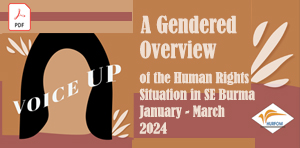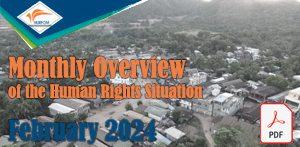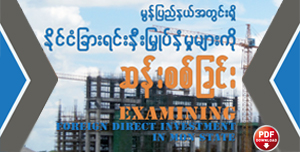SPDC confiscating and reselling vehicles in Mon State
October 21, 2008
HURFOM:SPDC authorities in Mon State are seizing unlicensed trucks while also selling vehicles that have already been impounded. Purchasing the vehicles from government officials does not confer them any legitimacy, and residents are reluctant to buy the vehicles because they are likely to be seized again.
Authorities set up two new checkpoints in Moulmein in the second week of October. Drivers passing through the checkpoints must prove their vehicles to be registered, or have them impounded. An unknown number of vehicles have been seized, but a HURFOM field reporter witnessed the seizure of two trucks on the night of October 14th.
News of the checkpoints spread quickly throughout the area. Owners without auto licenses are afraid to drive, and many are hiding vehicles at home or in the forest.
One checkpoint is located at the Than Lwin Bridge, which controls access to Moulmein from the west. The second is located at a busy roundabout where the roads to Kyaitmaryaw and Karen State enter Moulmein. The checkpoints are operated by soldiers, traffic police and road transportation authorities.
Confiscated vehicles are temporarily stored at Moulmein Stadium, before disappearing to Naypyidaw, the Southeast Command headquarters and other locations undisclosed.
At the same, army officers are quietly letting it be known that vehicles seized in years past are up for sale, says a HURFOM field reporter in Par Ook. Par Ook, 12 kilometers from Moulmein, is close to the headquarters of the Southeast Command and home to a high concentration of military and government personnel.
On the morning of October 16th, the reporter was able to listen to a tea shop conversation between a high level officer and businessmen. Cars seized in 2005 are up for sale, at a cost of between 2 and 3 million kyat, the officer said.
A HURFOM reporter in Mudon Township also reported that confiscated vehicles are being sold. Two trucks, originally seized in 2007, were recently bought from Light Infantry Battalion No. 210 for 2.5 and 3 million kyat.
The reporter in Par Ook, however, reported that people are hesitant to buy the impounded vehicles for fear that they will be seized again. A man close to an auto trader in Moulmein agreed, saying, “At the same time they confiscate trucks they want to sell others. What kind of policy are they implementing? Nobody can be sure what the authorities will do.” Sources in the New Mon State Party report that even the party is hesitant to purchase the vehicles for fear that they will simply be reconfiscated.
According to research by HURFOM field reporters, more than 2,000 vehicles in Mon State were seized from 2005 until 2008. The number was calculated based on information compiled from monasteries, villagers and ethnic ceasefire groups including the NMSP, Karen National Union, Karen Peace Front and Democratic Buddhist Army. In an extreme example, eight vehicles were seized from the Kawpein Monastery alone, 2 kilometers from Moulmein, said a former monk.
An officially licensed vehicle, imported by sanctioned businesses in Rangoon, can typically be expected to cost 5 billion kyat. Legally owning a vehicle in Burma is consequently prohibitively expensive for most residents and autos are generally imported illegally from Thailand and China. These vehicles can be licensed. Though cheaper than buying a legal vehicle in Rangoon such licensing is still expensive; in the last five months, a one year license purchased in Moulmein cost between 1.7 and 2 million kyat.
Comments
Got something to say?
You must be logged in to post a comment.

















































